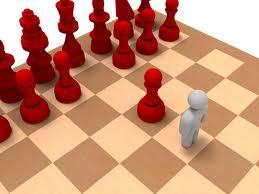Count it.....
 What is the sum of total number of squares and rectangles on a
1
1
×
1
1
chessboard ?
What is the sum of total number of squares and rectangles on a
1
1
×
1
1
chessboard ?
Details
Since rectangles are squares, you are not supposed to double count the squares.
The answer is 4356.
This section requires Javascript.
You are seeing this because something didn't load right. We suggest you, (a) try
refreshing the page, (b) enabling javascript if it is disabled on your browser and,
finally, (c)
loading the
non-javascript version of this page
. We're sorry about the hassle.
5 solutions
The formula for calculating the number of rectangles is 12c2 X 12c2,which results in 4356. Since all the squares can be counted as rectangles,the total number is 4356.
Number of Rectangles = n c 2 × n c 2
where n is the number of lines formed by chessboard horizontally and vertically separately.
Considering the diagonal of a rectangle it could start in any of the intersections of the lines dividing the board and end at any other so there are (12 * 12) * (11 * 11) = 17424 diagonals. However, note each rectangle has two diagonals each of which can be described in two directions. So 17424 / 4 gives 4356 rectangles.
All the squares can be counted by the formula n 2 + n − 1 2 ........... 1 2 . All the rectangles can be counted by the formula n × n = [ n ( n − 1 ) / 2 ] 2 .
Note that the formula for rectangles should be ( 2 n + 1 ) 2 . In particular, I get that the answer should be ( 2 1 2 ) 2 = 4 3 5 6 .
Can you explain your solution in more detail and provide the steps that you used?
Note that you already said "not supposed to double count the squares", so I don't understand why you're adding n 2 + ( n − 1 ) 2 + … + 1 2 .
Small Typo: "Squares are rectangles", not "rectangles are squares".
All sqaures are special case of rectangles (i.e. when the two sides get equal). So, it would be suffice to find number of all the rectangles.
Consider a n x m chessboard. Making a rectangle is equivalent to choosing any 2 points from (n+1) points along n-axis; and choosing any 2 points from (m+1) points along m-axis.
Thus, ( 2 n + 1 ) x ( 2 . m + 1 )
Here we have n = m = 11. So, ( 2 1 2 ) 2 = 4356